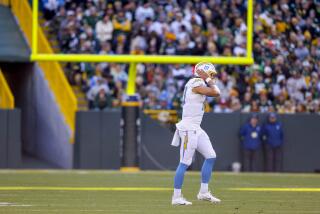Bad Breaks Evened Out for Bengals and 49ers
- Share via
MIAMI — Never has a Super Bowl caused so much physical pain so early. In the first 7 minutes of Super Bowl XXIII Sunday night, two players who have made major contributions all season went down with broken legs.
The second injury was one of the most graphic and severe in Super Bowl history. It happened to Tim Krumrie, the Cincinnati Bengals’ Pro Bowl nose tackle, when he stepped awkwardly while tackling San Francisco 49ers running back Roger Craig. The damage: a broken left tibia and fibula--the two major bones below the knee.
On the third play of the game’s first series, San Francisco tackle Steve Wallace suffered a broken left fibula. After Joe Montana was hit as he threw a 10-yard completion to Craig, Montana crashed into Wallace’s left leg. Wallace’s leg was bent at an awkward angle, causing his left fibula to snap.
With 8:06 left in the first quarter, Krumrie’s season ended. On first-and-10 from the 49ers’ 3, Craig broke through the middle of the line and was chased by Krumrie. He got a grip on Craig, and as he tried to tackle him, Krumrie’s left ankle collapsed. As replays showed graphically, Krumrie went airborne to complete the tackle, and as he did, his leg below the knee flopped grotesquely. It obviously was broken.
As the injury happened, Bengals Coach Sam Wyche seemed to sense the severity of it. He shook his head, then stared glumly at the ground.
The NFL said Krumrie chose to remain in the locker room and watch the game on television. He remained there into the second half before doctors advised him to go to a hospital. Wallace remained at the stadium.
Replacing Wallace was Bubba Paris, the veteran 310-pounder. In the Bengals’ basic 3-4 defense, rookie David Grant took Krumrie’s place; in the four-man line, Grant and Skip McClendon were the tackles.
Bengals defensive coordinator Dick LeBeau said, “It was obviously a big loss, losing Timmy the way we did. But you’ve got to hand it to Grant. I thought he played an incredible ballgame.”
There was history staring Cincinnati Bengals kicker Jim Breech in the face, but it was such a familiar position to be in. He’d been in the same position all week.
The situation, in Sunday’s Super Bowl XXIII against the San Francisco 49ers: score tied, 13-13, with 4:25 left in the game, and a field-goal attempt of 40 yards lined up slightly left of the center of the field.
“I liked being in the position right then, because I probably kicked that exact same kick 10 or 15 times this week in practice,” said Breech, downcast after the 49ers won, 20-16.
“There was some wind, more wind than I’d faced during the week. But I felt good. The hold was good and the snap was good. When I kicked it, I didn’t kick it very well; it didn’t hit the net or anything. But it was enough.”
Enough then. But not enough for a victory.
“To be that close hurts so much,” Breech said, speaking softly. “I didn’t care how we won. I didn’t care if I kicked five extra points or three field goals. I just wanted to win so bad.”
Breech did his part. He kicked field goals of 34, 43 and 40 yards--the only points the Bengals’ offense scored--but got no support from the other components of the Cincinnati offense. “And look at how great the 49ers are in the 2-minute offense,” Breech said. “I didn’t think it was over when I made my kick.”
More to Read
Go beyond the scoreboard
Get the latest on L.A.'s teams in the daily Sports Report newsletter.
You may occasionally receive promotional content from the Los Angeles Times.










